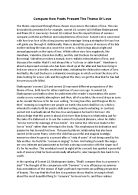In “My Last Duchess” and “Porphyria’s Lover”, how does Browning condemn the male personas’ view that the control they deem essential in a relationship can be attained only through violence?
In “Porphyria’s Lover” and “My Last Duchess”, Browning explores the male psyche by portraying two men so obsessed by domination and control that they are finally driven to kill their lovers. Written in the 19th century, these poems are set in a patriarchal society in which female subservience was expected and male supremacy absolute. In “Advice to a Husband” Cobbett states that “A husband under command of his wife is the most contemptible of god’s creatures.” And it is this proclamation, viewed by many of the time that drives the protagonists of the two poems to the extremes. Despite the fact that the poems are written in dramatic monologues, the text contains certain clues which voice Browning’s judgment and condemnation of the drastic actions taken by the male figures and thus society’s role of trapping women under the rule of men.
Neither the Duke nor the lover meet the expectations that the reader has of a protagonist of a Romantic poem. Instead Browning’s presentation of flawed men as opposed to romantic heroes suggests that Browning is playing against his reader’s expectations. The Duke’s description of his wife quickly reveals that he is a paranoid character; his speculative suggestion of what Frà Pandolf might have “chanced to say” reveals that he even suspects his wife of flirting with a monk. The lover is also a jealous character. He thinks that Porphyria is “weak” as she will not free herself “from pride and vainer ties dissever, / And give herself to me forever.” When the lover realises Porphyria’s affections for him he becomes so crazed by power that he strangles her with the “long yellow string” of her own hair. In contrast to “My Last Duchess”, the poem makes completely clear to the reader that Porphyria is cruelly murdered by her lover. However the reader is led to suspect that a similar crime also occurs in “My Last Duchess.” The Dukes language is clinical and free from emotion as he declares “I gave commands; / Then all smiles stopped together.







